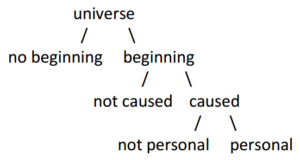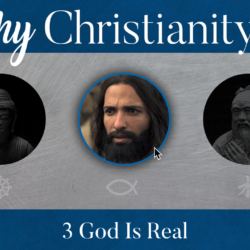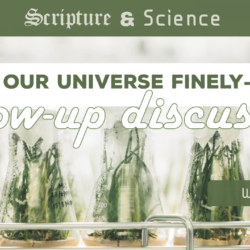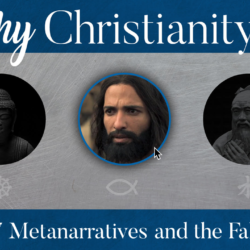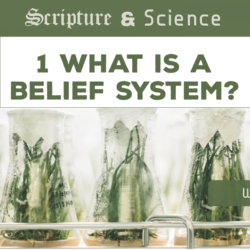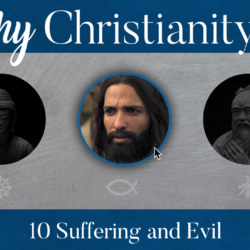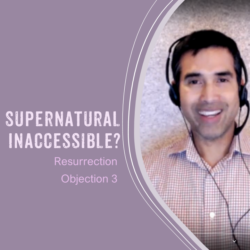Apologetics 5: Arguments for God (Part Two)
In this lecture, you’ll learn four more reasons for God’s existence, including the cosmological argument, moral argument, miracles argument, and the ontological argument. These are each quite different from each other, which is great because it increases their cumulative effect. Last of all, you’ll learn about “Pascal’s Wager,” which is really just an appeal to self-interest, so you can share your faith effectively with skeptics.
If you would like to take this class for credit, please contact the Atlanta Bible College so you can register and do the necessary work for a grade.
Notes:
First Cause (Cosmological Argument)
Here are all the possibilities for thinking about the beginning of the universe:
Three step argument
- Everything that has a beginning has a cause of its beginning
- The universe has a beginning
- 2nd law of thermo (Meister, p. 93-94)
- big bang theory(Meister, p. 96)
- cannot cross an actual infinite series of events (Mesiter, p. 99)
- The universe has a cause of its beginning
- The universe did not cause itself because it did not exist before its beginning
- The cause of the universe must be external to it (i.e. super-natural)
- This cause must be sufficiently powerful to bring the universe into existence
- There are only two kinds of causes: personal or impersonal processes
- If a process caused the universe to come into existence then how does one explain the fact that the universe did not always exist? Can an impersonal process one day begin to do something? Thus the cause must have been personal (i.e. a being or beings with a will(s))
Two drawbacks to this argument
- it does not rule out multiple gods
- it does not rule out the possibility of an infinite succession of gods
Who made God?
- God was always there. Since he does not have a beginning he does not need a cause.
- then the universe could have always been here and we don’t need to posit the existence of a god to explain it
- theoretically this is correct except for one thing: all scientists now agree that the universe did not always exist (2nd law of thermodynamics)
Argument from Morality
Some actions are morally wrong (like torturing children for the fun of it)
- These actions are moral absolutes
- If there are moral absolutes there must be some moral law by which they can be determined
- If there is a moral law then there must be a moral law giver or else it must be produced by natural processes
- Assuming naturalism one social “law” becomes apparent: might makes right (also called survival of the fittest)
- If this is the true law by which morals are to be determined then it is moral to do anything one wants so long as he or she is strong enough to accomplish it
- This legalizes rape, murder, genocide, and torturing children for the fun of it
- But we have already said that torturing children for the fun of it is absolutely morally wrong
- Thus, morals are not determined by nature and there exists (or existed) a moral law giver who is itself the locus of true morality
- this doesn’t mean athiests are not moral people, they may be, they just don’t have a grounding or foundation for being moral
God Experiences
- miracles
- defined as an event that could not happen based on the laws of nature
- there are many claims to miracles throughout time and also in our own day
three options
- all miracles are either honest mistakes or hoaxes (there are no miracles)
- all miracles are authentic (everyone claim is true)
- some miracles are authentic and some are inauthentic (whatever that percentage may be)
naturalists take position one
- in order to disprove this one need only document one miracle to a reasonable level of certainty
- this can be done for the resurrection of Jesus
personal experience of God (testimony)
- people routinely claim to have met God and been changed by him
- heroin addicts are miraculously delivered
- hardened murderers suddenly believe and become gentle
- appetite for sin is diminished and craving holiness emerges
The Ontological Argument
This argument is based on reason alone
Some advantages to the ontological argument:
- Someone could know that there is a God without the use of any of their five senses
- The argument is a faith builder. It is another reason to believe that there is a God… it is rather likely that if God does exist and did create man then He would instate in His creation a series of methods by which we may be enlightened to His existence
- Advantage to monotheists over polytheists=>the argument proves that there is only one God
The greatest conceivable being (GCB)
- What properties make up the GCB? (do admit to a built-in maximum)
- Omnipotence, omniscience, omnipresence are indisputably the greatest properties imaginable
- There can only be one GCB.
- If one could imagine something greater or equal to the GCB then the GCB was not truly the greatest.
Saint Anselm’s First Ontological Argument
- It is a conceptual truth (or, so to speak, true by definition) that God is a being than which none greater can be imagined (i.e., the greatest possible being that can be imagined).
- God exists as an idea in the mind.
- A being that exists as an idea in the mind and in reality is, other things being equal, greater than a being that exists only as an idea in the mind.
- Thus, if God exists only as an idea in the mind, then we can imagine something that is greater than God (i.e., a greatest possible being that does exist).
- But we cannot imagine something that is greater than God (for it is a contradiction to suppose that we can imagine a being greater than the greatest possible being that can be imagined.)
- therefore, God exists.
Pascal’s Wager
Either receiving eternal life or losing little or nothing is clearly preferable to experiencing God’s wrath and destruction in hell or gaining little or nothing. It is therefore in our interests to believe in God.

